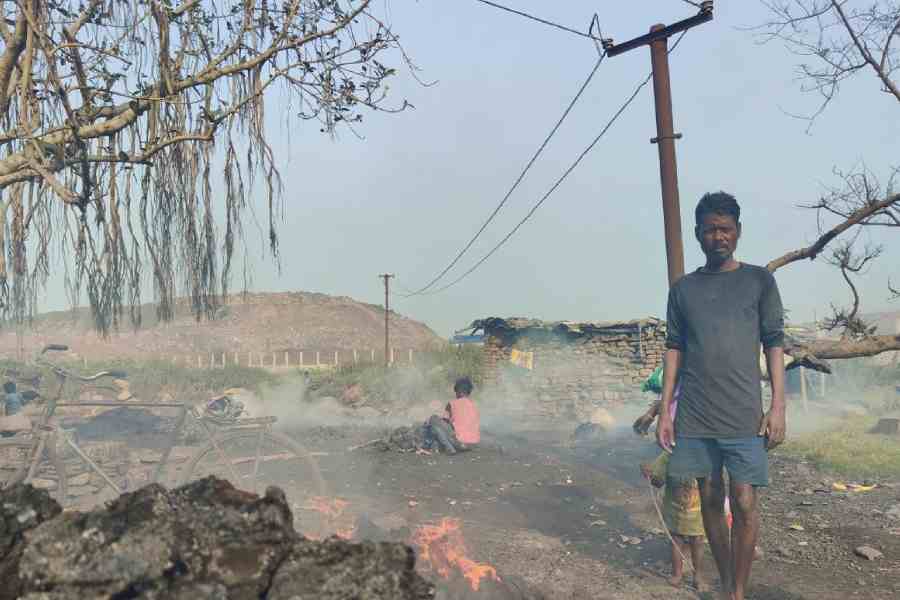Manoj Bhuiyan says he is around 30, but he looks 60. He has spent most of his life beside fires in Jharia’s Moharibandh, coking coal from illegal mines. This crudely produced coke is fuel for hotels and homes in India’s coal hub of Dhanbad where blood feuds of yore remain at the frontlines of electoral battles.
The rivalries of slain union leaders and their kin make no difference to Bhuiyan and many other voters in Jharkhand’s coal belt. “Is any politician better or worse than any other?” Bhuiyan says when asked what has motivated him to vote without fail every time since he became eligible.
Like his uncertain age, he is also uncertain about whether his life was better or worse five years back, or any number of years ago.
“The only government schemes my family has benefited from are rations and resettlement,” Bhuiyan says. The resettlement scheme was launched in 2009 for those in Jharia whose dwellings were caving in because of more-than-a-century-old underground coal fires.
Bhuiyan’s wife has not received the Hemant Soren government’s recent Maiya Samman dole for women. “We don’t even have a bank account as the manager asks us to bring a coalfield employee as an introducer. Who will be an introducer for people like us who are here now, dead tomorrow? But my children will have a better life,”he says.
Two of his children study in a state government residential school, and three others are day scholars. “The government schools are better now. I don’t care which bahu wins. But once they finish school, my children should not come near coal.”
The daughters-in-law in question are Congress MLA Purnima Niraj Singh and BJP candidate Ragini Singh. Ragini’s late father-in-law Suryadeo Singh was a socialist strongman and four-time MLA from Jharia. Purnima was married to Niraj Singh — the sonof Suryadeo’s brother Rajan.
Niraj was gunned down in 2017, a probable consequence of a chain of previous murders and attempts on the lives of members and loyalists of both branches of the family. Ragini’s husband Sanjeev Singh, a former BJP MLA, is currently under trial for Niraj’s murder.
In the same district, the widow of one union leader faces the son of another slain union leader.
BJP MLA Aparna Sengupta’s husband, Forward Bloc strongman Sushanta Sengupta, was accused of murdering former Marxist Coordination Committee MLA Gurudas Chatterjee in 2000. Chatterjee’s son Arup — later elected to the Assembly twice — was a suspect in the murder of Sushanta in 2002. Aparna switched to the BJP in 2015 and Chatterjee’s party merged with the CPIML Liberation this year.
Aparna and Arup have contested the Nirsa seat in every election since 2005.
A miner in Fatka who has switched allegiance from Aparna to Arup this time explained: “Neither has been able to bring much development to Nirsa. We have to take patients to Dhanbad, 40km away, as no doctor is ever to be found in the Nirsa hospital. This time Arupbabu may work better as he will have the support of new ally Jharkhand Mukti Morcha (JMM).”
Ask about the rivalries of Gurudas and Sushanta, and the Singh clans, and voters point to other things.
In Nirsa’s Keliasol, Samir Mondal draws attention to the broken road to Nirsa. “Union rivalries matter only to the coal politicians. For us, the road matters.”
In Jharia’s Baniahir, Soni Devi highlights a pipe jutting out of the ground that occasionally coughs out water that 15 families subsist on. “One of the bahus will win, but who will bring water?” she asks.
A fourth-generation hotelier in the district explains: “Despite all their rivalries, I have never felt unsafe here. Unlike the Tatas who are responsible for everything in Jamshedpur, here Bharat Coking Coal Limited only manages its own premises. They don’t seem much bothered by the coal fires, and it is perhaps in their interest that we all simply leave the place.”
He adds: “As for the strongmen, they attend each other’s children’s weddings despite their rivalries. They benefit from the coal fires as they get the contracts to fill sand in the mines. The fire only burns us.”
Jharia and Nirsa vote on November 20










